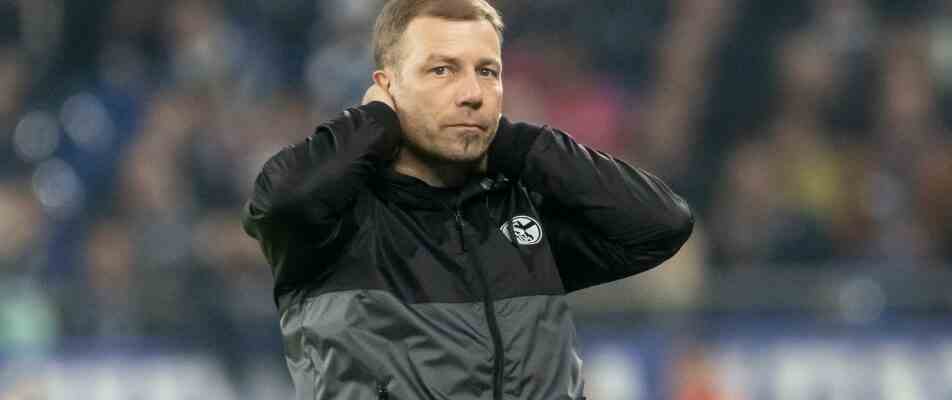In the event of an opponent’s corner kick, André Breitenreiter normally sends the entire crew into defense without exception. “Why do without a man?” asked the TSG Hoffenheim coach rhetorically in the small discussion group: A corner kick for the opponent means that you have to prevent a goal being conceded, a counter-attack with your own goal only succeeds in one out of a hundred cases, and that’s why he refrains from posting a striker in the front position for a possible counterattack – normally.
On Friday evening at quarter past nine in Gelsenkirchen, Breitenreiter ignored the norm. He ordered attacker Georginio Rutter to the halfway line while Schalke 04 almost entirely gathered to the corner in and around the Hoffenheim penalty area, and the French striker then promptly ran away from his lonely opponent Cedric Brunner after receiving the ball from goalkeeper Oliver Baumann. Shortly thereafter, Munas Dabbur completed the exceptional case of one of 100 with the 2-0 for TSG. “We surprised Schalke,” said Breitenreiter with a smug undertone.
When the question of questions is discussed in Gelsenkirchen at the weekend – namely the whereabouts of head coach Frank Kramer – then it should also be about this moment of surprise that decided between victory and defeat in the game against TSG. Dabbur’s 2-0 just before the break whistle brought the shock that Schalke couldn’t take anymore, it was the beginning of the end, which turned out to be merciful with a 0-3 defeat. Kramer was coached in the classic form by his colleague. “That mustn’t happen,” said Schalke’s coach to the scene in question, and he was absolutely right: It couldn’t happen that only Brunner was turned off to stop a possible counterattack via the extremely fast Rutter.
The fact that Schalke manager Rouven Schröder later insisted that Brunner was at fault (“you have to play a foul”) was obviously a maneuver to defend the coach. But the big picture on the lawn after the final whistle was already evidence of the advanced mood of farewell. Kramer no longer found a place in the middle of the team and his fellow coaches, even the bulbous-nosed mascot Erwin refrained from a solidarity gesture of consolation because it did not fit into the emotional events. The obligatory unit summoning circle with players and supervisors no longer took place, and the audience largely refrained from anti-coach rallies – on the one hand out of decency, on the other hand out of the feeling that further protest was unnecessary anyway.
Sports boss Schröder was still fighting defensively on Friday evening to gain time for talks with the board and supervisory board. “Frank Kramer is our coach,” he said, but he also said that there were “no guarantees” that he would still be there when he met Hoffenheim in the DFB Cup game on Tuesday.
On Saturday, the reports from the club’s crisis meetings actually indicated that Kramer would still be in charge of this game. But Schröder would have to explain to the committees not only why it would be better to change coaches, but also why Kramer signed at all in June, especially in the important Bundesliga game next weekend against Hertha BSC, who is a direct competitor in the relegation battle became. Schröder could at least partially return the issue to those responsible: Ultimately, the strict austerity course also led to Kramer, who was inexpensive and open to all adverse arrangements, hired as the successor to the rise hero Mike Büskens. Schalke chose the simplest solution – despite industry-wide knowledge that justifies reservations about Kramer’s coaching work.
Then extra costs could arise again: for the severance payment of the old and the wages of the new coach. The favorite is Thomas Reis, 49, who has coached VfL Bochum for the last three years with good success, but was recently dismissed after a false start and discord. The discrepancies also had to do with the fact that he was in contact with Rouven Schröder in May. The two know each other from playing together at VfL.
Against Hoffenheim, Kramer had called up a team that surprised the spectators with a positive football draft. Two players acted in the center that the coach had largely withheld from them until now because they obviously didn’t fit into his game idea. Now the Czech Alex Kral and the Frenchman Florent Mollet, both signed in the summer and welcomed by manager Schröder with advance stories, were allowed to play together in midfield for the first time. They significantly increased the level of play. On Friday, Kramer explained in an astonishing way why Mollet, 30, had hardly played and recently even sat in the stands more often: “He’s a good kicker, but he comes from a different league and speaks a different language.” However, Mollet does not speak Chinese, but French, and he is familiar with professional football thanks to 173 appearances in the first French league, among other things. However, Kramer thought he needed “time to get used to it”.
Thanks to Mollet and Kral, Schalke had more than half a dozen promising goals before the break, the first half was “really fun,” said center forward Simon Terodde, who has rarely enjoyed Kramer’s football and is therefore attributed to the internal opposition.
TSG showed more class and strategy, but Schalke coped well with the setback of the early 0-1 by Robert Skov’s penalty (11th) and kept up well. Until 0:2. “In one situation or another, we didn’t defend well, you have to say that,” admitted Terodde, touching on a central problem. Kramer has never been able to balance the defensive and offensive elements in the almost four months of his tenure, he has not developed any strengths and has not eliminated weaknesses, and the trend does not suggest improvement, but rather a deepening of the contrasts. In particular, the first half on Friday evening indicated that a successful relegation battle with this Schalke team will certainly be difficult – but still possible.

